Comparing Euripides' Medea and Apollonius' Argonautica in CLA204
VerifiedAdded on 2022/07/28
|6
|1474
|19
Essay
AI Summary
This essay provides a comparative analysis of Euripides' Medea and Apollonius Rhodius' Argonautica, examining their portrayal of Greek values and social norms. The essay explores the similarities and differences between the two myths, focusing on the character of Jason and the cultural context of ancient Greece. It highlights how both works, though created in different eras, reflect the societal views of the time, including the roles of men and women. The essay delves into the non-heroic depiction of Jason and his relationships, contrasting the narratives and themes presented by the authors. It also discusses how the works relate to the Peloponnesian War and the cultural and political context of the time. The essay concludes by emphasizing the significance of both works in understanding ancient Greek culture and mythology.
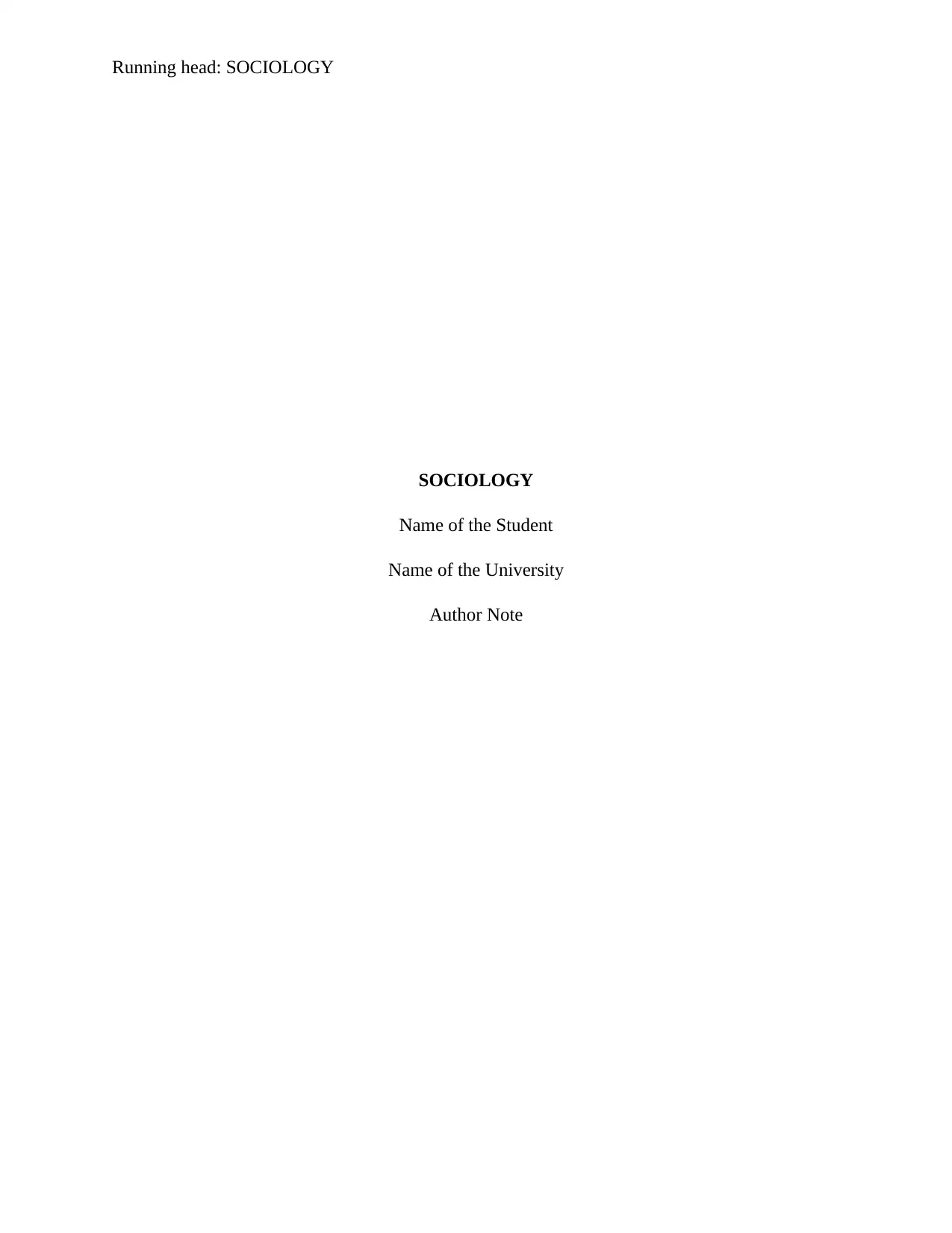
Running head: SOCIOLOGY
SOCIOLOGY
Name of the Student
Name of the University
Author Note
SOCIOLOGY
Name of the Student
Name of the University
Author Note
Paraphrase This Document
Need a fresh take? Get an instant paraphrase of this document with our AI Paraphraser
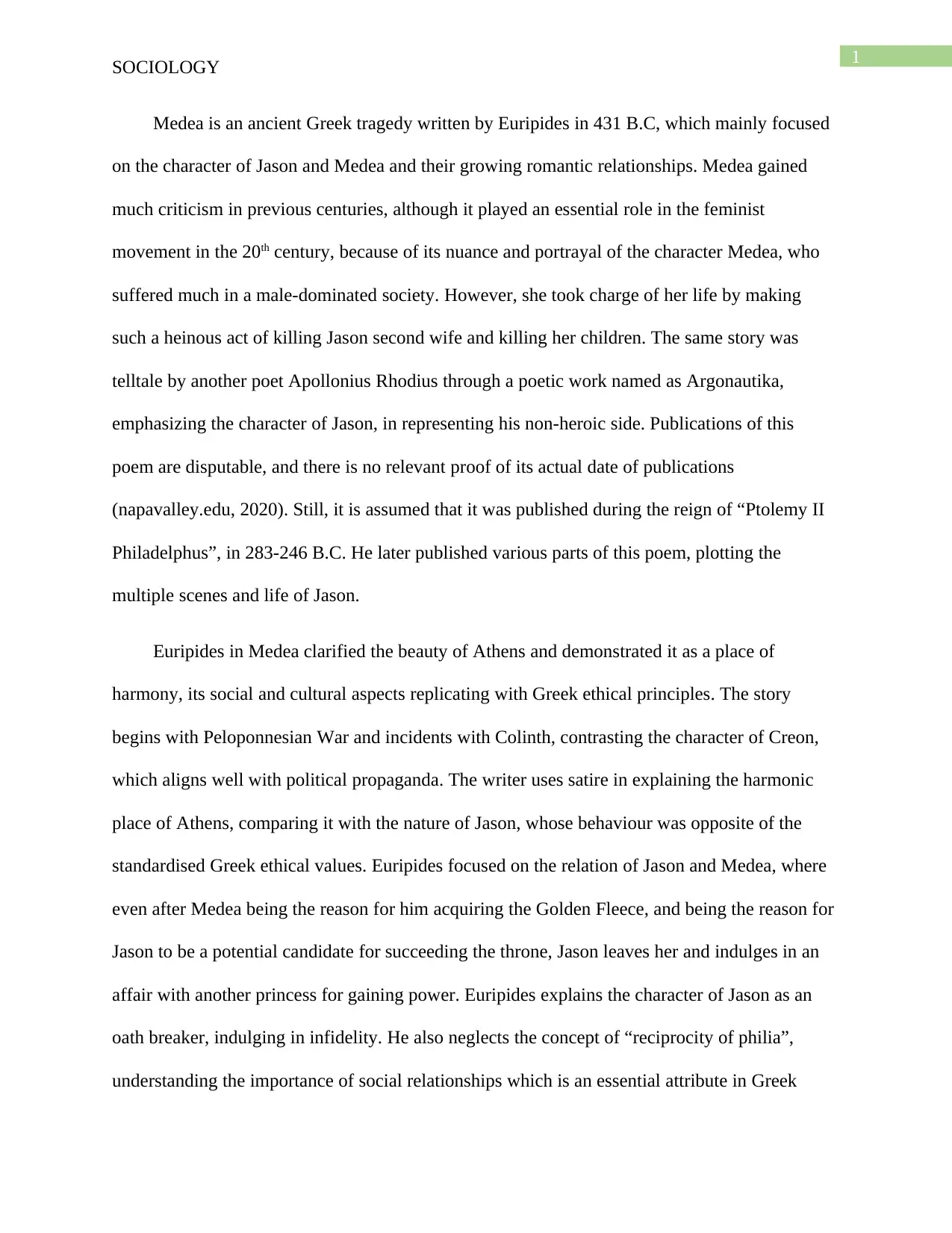
1
SOCIOLOGY
Medea is an ancient Greek tragedy written by Euripides in 431 B.C, which mainly focused
on the character of Jason and Medea and their growing romantic relationships. Medea gained
much criticism in previous centuries, although it played an essential role in the feminist
movement in the 20th century, because of its nuance and portrayal of the character Medea, who
suffered much in a male-dominated society. However, she took charge of her life by making
such a heinous act of killing Jason second wife and killing her children. The same story was
telltale by another poet Apollonius Rhodius through a poetic work named as Argonautika,
emphasizing the character of Jason, in representing his non-heroic side. Publications of this
poem are disputable, and there is no relevant proof of its actual date of publications
(napavalley.edu, 2020). Still, it is assumed that it was published during the reign of “Ptolemy II
Philadelphus”, in 283-246 B.C. He later published various parts of this poem, plotting the
multiple scenes and life of Jason.
Euripides in Medea clarified the beauty of Athens and demonstrated it as a place of
harmony, its social and cultural aspects replicating with Greek ethical principles. The story
begins with Peloponnesian War and incidents with Colinth, contrasting the character of Creon,
which aligns well with political propaganda. The writer uses satire in explaining the harmonic
place of Athens, comparing it with the nature of Jason, whose behaviour was opposite of the
standardised Greek ethical values. Euripides focused on the relation of Jason and Medea, where
even after Medea being the reason for him acquiring the Golden Fleece, and being the reason for
Jason to be a potential candidate for succeeding the throne, Jason leaves her and indulges in an
affair with another princess for gaining power. Euripides explains the character of Jason as an
oath breaker, indulging in infidelity. He also neglects the concept of “reciprocity of philia”,
understanding the importance of social relationships which is an essential attribute in Greek
SOCIOLOGY
Medea is an ancient Greek tragedy written by Euripides in 431 B.C, which mainly focused
on the character of Jason and Medea and their growing romantic relationships. Medea gained
much criticism in previous centuries, although it played an essential role in the feminist
movement in the 20th century, because of its nuance and portrayal of the character Medea, who
suffered much in a male-dominated society. However, she took charge of her life by making
such a heinous act of killing Jason second wife and killing her children. The same story was
telltale by another poet Apollonius Rhodius through a poetic work named as Argonautika,
emphasizing the character of Jason, in representing his non-heroic side. Publications of this
poem are disputable, and there is no relevant proof of its actual date of publications
(napavalley.edu, 2020). Still, it is assumed that it was published during the reign of “Ptolemy II
Philadelphus”, in 283-246 B.C. He later published various parts of this poem, plotting the
multiple scenes and life of Jason.
Euripides in Medea clarified the beauty of Athens and demonstrated it as a place of
harmony, its social and cultural aspects replicating with Greek ethical principles. The story
begins with Peloponnesian War and incidents with Colinth, contrasting the character of Creon,
which aligns well with political propaganda. The writer uses satire in explaining the harmonic
place of Athens, comparing it with the nature of Jason, whose behaviour was opposite of the
standardised Greek ethical values. Euripides focused on the relation of Jason and Medea, where
even after Medea being the reason for him acquiring the Golden Fleece, and being the reason for
Jason to be a potential candidate for succeeding the throne, Jason leaves her and indulges in an
affair with another princess for gaining power. Euripides explains the character of Jason as an
oath breaker, indulging in infidelity. He also neglects the concept of “reciprocity of philia”,
understanding the importance of social relationships which is an essential attribute in Greek
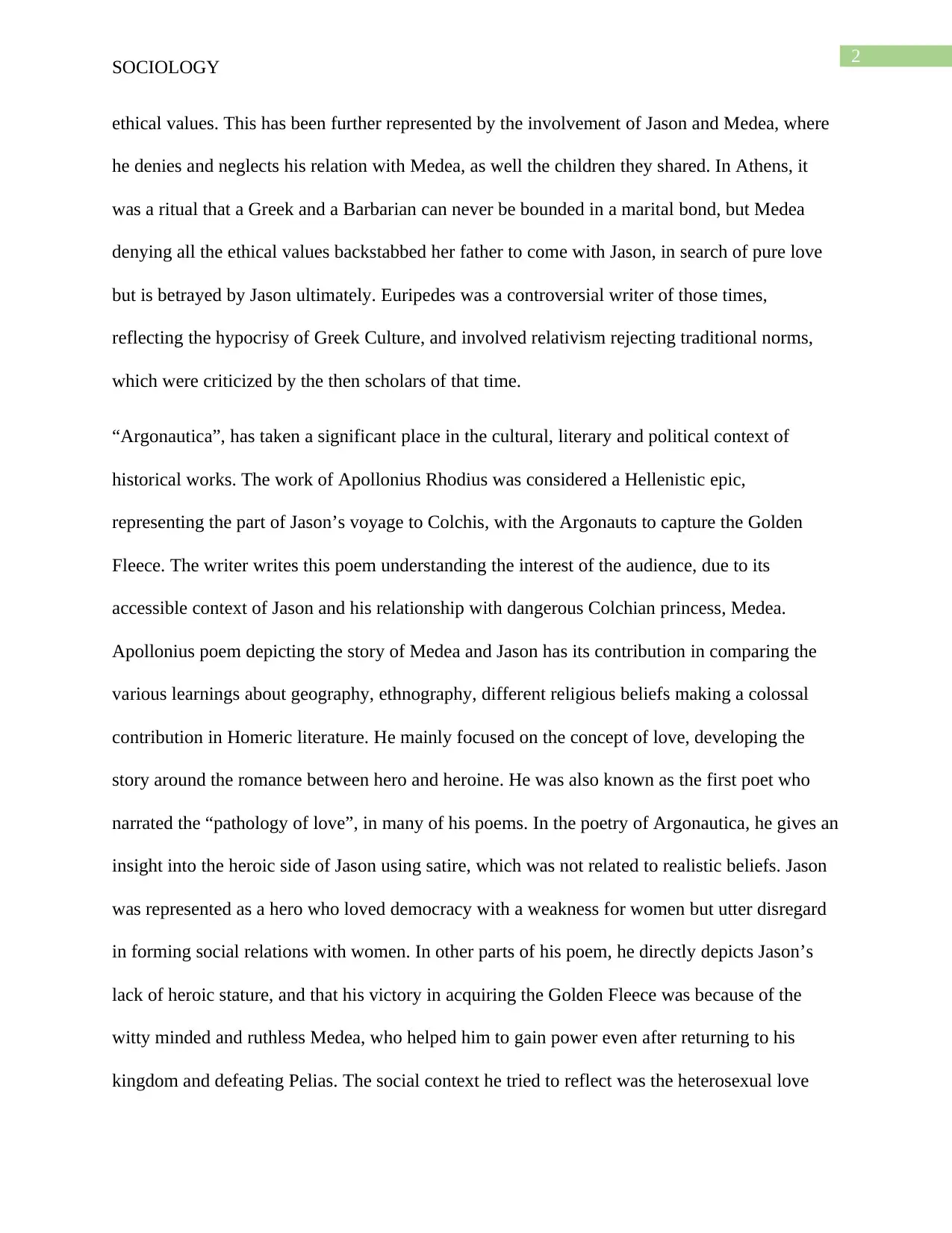
2
SOCIOLOGY
ethical values. This has been further represented by the involvement of Jason and Medea, where
he denies and neglects his relation with Medea, as well the children they shared. In Athens, it
was a ritual that a Greek and a Barbarian can never be bounded in a marital bond, but Medea
denying all the ethical values backstabbed her father to come with Jason, in search of pure love
but is betrayed by Jason ultimately. Euripedes was a controversial writer of those times,
reflecting the hypocrisy of Greek Culture, and involved relativism rejecting traditional norms,
which were criticized by the then scholars of that time.
“Argonautica”, has taken a significant place in the cultural, literary and political context of
historical works. The work of Apollonius Rhodius was considered a Hellenistic epic,
representing the part of Jason’s voyage to Colchis, with the Argonauts to capture the Golden
Fleece. The writer writes this poem understanding the interest of the audience, due to its
accessible context of Jason and his relationship with dangerous Colchian princess, Medea.
Apollonius poem depicting the story of Medea and Jason has its contribution in comparing the
various learnings about geography, ethnography, different religious beliefs making a colossal
contribution in Homeric literature. He mainly focused on the concept of love, developing the
story around the romance between hero and heroine. He was also known as the first poet who
narrated the “pathology of love”, in many of his poems. In the poetry of Argonautica, he gives an
insight into the heroic side of Jason using satire, which was not related to realistic beliefs. Jason
was represented as a hero who loved democracy with a weakness for women but utter disregard
in forming social relations with women. In other parts of his poem, he directly depicts Jason’s
lack of heroic stature, and that his victory in acquiring the Golden Fleece was because of the
witty minded and ruthless Medea, who helped him to gain power even after returning to his
kingdom and defeating Pelias. The social context he tried to reflect was the heterosexual love
SOCIOLOGY
ethical values. This has been further represented by the involvement of Jason and Medea, where
he denies and neglects his relation with Medea, as well the children they shared. In Athens, it
was a ritual that a Greek and a Barbarian can never be bounded in a marital bond, but Medea
denying all the ethical values backstabbed her father to come with Jason, in search of pure love
but is betrayed by Jason ultimately. Euripedes was a controversial writer of those times,
reflecting the hypocrisy of Greek Culture, and involved relativism rejecting traditional norms,
which were criticized by the then scholars of that time.
“Argonautica”, has taken a significant place in the cultural, literary and political context of
historical works. The work of Apollonius Rhodius was considered a Hellenistic epic,
representing the part of Jason’s voyage to Colchis, with the Argonauts to capture the Golden
Fleece. The writer writes this poem understanding the interest of the audience, due to its
accessible context of Jason and his relationship with dangerous Colchian princess, Medea.
Apollonius poem depicting the story of Medea and Jason has its contribution in comparing the
various learnings about geography, ethnography, different religious beliefs making a colossal
contribution in Homeric literature. He mainly focused on the concept of love, developing the
story around the romance between hero and heroine. He was also known as the first poet who
narrated the “pathology of love”, in many of his poems. In the poetry of Argonautica, he gives an
insight into the heroic side of Jason using satire, which was not related to realistic beliefs. Jason
was represented as a hero who loved democracy with a weakness for women but utter disregard
in forming social relations with women. In other parts of his poem, he directly depicts Jason’s
lack of heroic stature, and that his victory in acquiring the Golden Fleece was because of the
witty minded and ruthless Medea, who helped him to gain power even after returning to his
kingdom and defeating Pelias. The social context he tried to reflect was the heterosexual love
⊘ This is a preview!⊘
Do you want full access?
Subscribe today to unlock all pages.

Trusted by 1+ million students worldwide
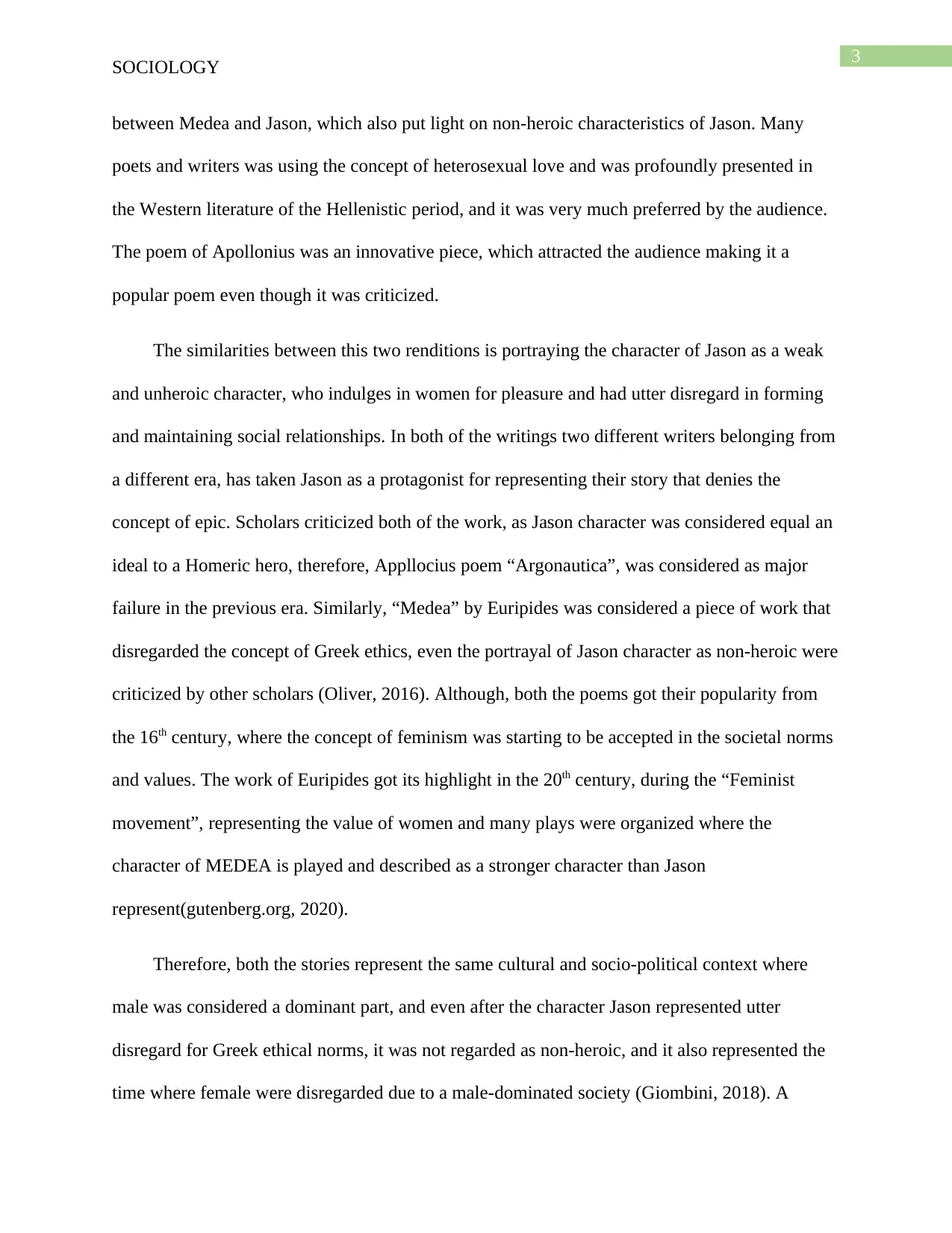
3
SOCIOLOGY
between Medea and Jason, which also put light on non-heroic characteristics of Jason. Many
poets and writers was using the concept of heterosexual love and was profoundly presented in
the Western literature of the Hellenistic period, and it was very much preferred by the audience.
The poem of Apollonius was an innovative piece, which attracted the audience making it a
popular poem even though it was criticized.
The similarities between this two renditions is portraying the character of Jason as a weak
and unheroic character, who indulges in women for pleasure and had utter disregard in forming
and maintaining social relationships. In both of the writings two different writers belonging from
a different era, has taken Jason as a protagonist for representing their story that denies the
concept of epic. Scholars criticized both of the work, as Jason character was considered equal an
ideal to a Homeric hero, therefore, Appllocius poem “Argonautica”, was considered as major
failure in the previous era. Similarly, “Medea” by Euripides was considered a piece of work that
disregarded the concept of Greek ethics, even the portrayal of Jason character as non-heroic were
criticized by other scholars (Oliver, 2016). Although, both the poems got their popularity from
the 16th century, where the concept of feminism was starting to be accepted in the societal norms
and values. The work of Euripides got its highlight in the 20th century, during the “Feminist
movement”, representing the value of women and many plays were organized where the
character of MEDEA is played and described as a stronger character than Jason
represent(gutenberg.org, 2020).
Therefore, both the stories represent the same cultural and socio-political context where
male was considered a dominant part, and even after the character Jason represented utter
disregard for Greek ethical norms, it was not regarded as non-heroic, and it also represented the
time where female were disregarded due to a male-dominated society (Giombini, 2018). A
SOCIOLOGY
between Medea and Jason, which also put light on non-heroic characteristics of Jason. Many
poets and writers was using the concept of heterosexual love and was profoundly presented in
the Western literature of the Hellenistic period, and it was very much preferred by the audience.
The poem of Apollonius was an innovative piece, which attracted the audience making it a
popular poem even though it was criticized.
The similarities between this two renditions is portraying the character of Jason as a weak
and unheroic character, who indulges in women for pleasure and had utter disregard in forming
and maintaining social relationships. In both of the writings two different writers belonging from
a different era, has taken Jason as a protagonist for representing their story that denies the
concept of epic. Scholars criticized both of the work, as Jason character was considered equal an
ideal to a Homeric hero, therefore, Appllocius poem “Argonautica”, was considered as major
failure in the previous era. Similarly, “Medea” by Euripides was considered a piece of work that
disregarded the concept of Greek ethics, even the portrayal of Jason character as non-heroic were
criticized by other scholars (Oliver, 2016). Although, both the poems got their popularity from
the 16th century, where the concept of feminism was starting to be accepted in the societal norms
and values. The work of Euripides got its highlight in the 20th century, during the “Feminist
movement”, representing the value of women and many plays were organized where the
character of MEDEA is played and described as a stronger character than Jason
represent(gutenberg.org, 2020).
Therefore, both the stories represent the same cultural and socio-political context where
male was considered a dominant part, and even after the character Jason represented utter
disregard for Greek ethical norms, it was not regarded as non-heroic, and it also represented the
time where female were disregarded due to a male-dominated society (Giombini, 2018). A
Paraphrase This Document
Need a fresh take? Get an instant paraphrase of this document with our AI Paraphraser
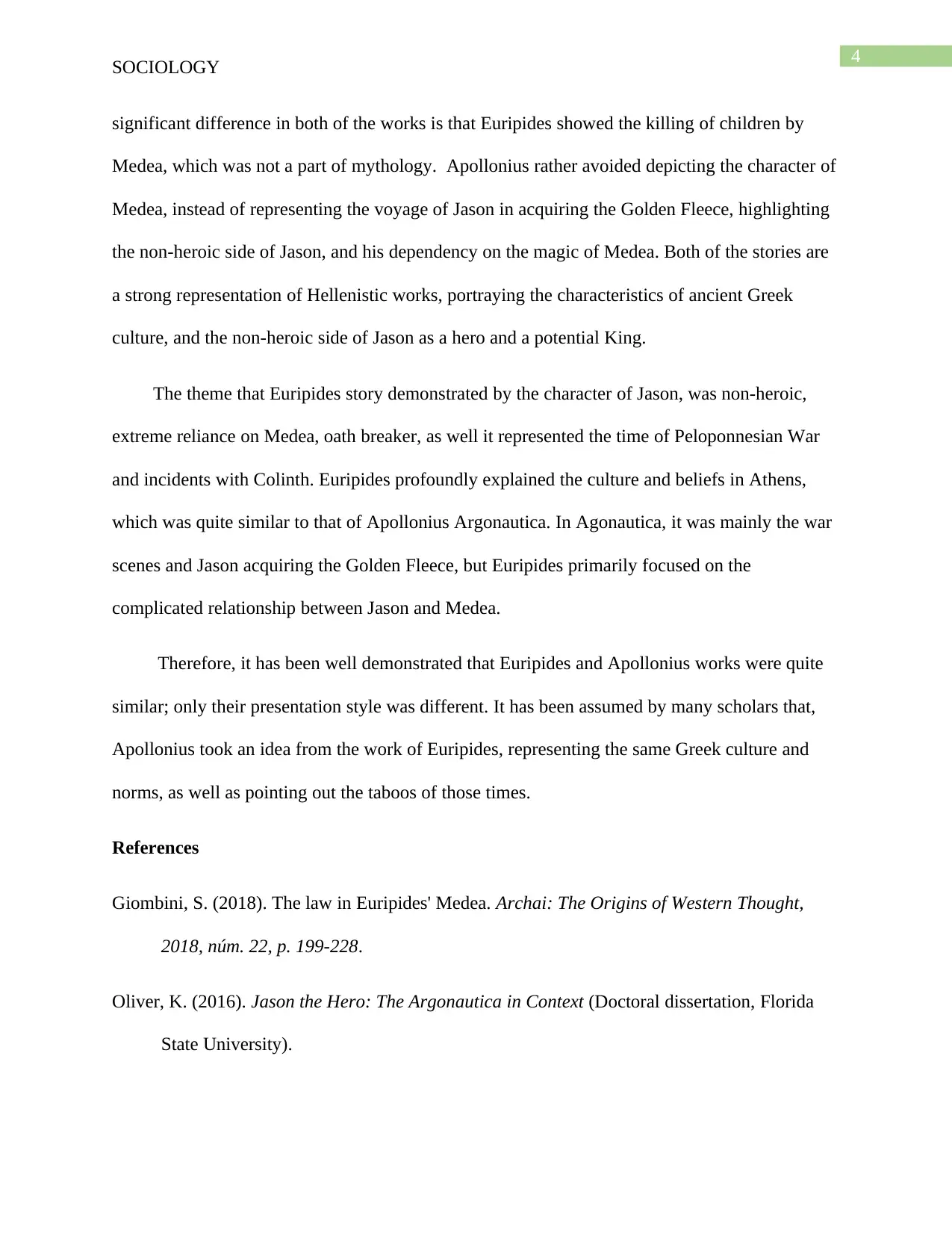
4
SOCIOLOGY
significant difference in both of the works is that Euripides showed the killing of children by
Medea, which was not a part of mythology. Apollonius rather avoided depicting the character of
Medea, instead of representing the voyage of Jason in acquiring the Golden Fleece, highlighting
the non-heroic side of Jason, and his dependency on the magic of Medea. Both of the stories are
a strong representation of Hellenistic works, portraying the characteristics of ancient Greek
culture, and the non-heroic side of Jason as a hero and a potential King.
The theme that Euripides story demonstrated by the character of Jason, was non-heroic,
extreme reliance on Medea, oath breaker, as well it represented the time of Peloponnesian War
and incidents with Colinth. Euripides profoundly explained the culture and beliefs in Athens,
which was quite similar to that of Apollonius Argonautica. In Agonautica, it was mainly the war
scenes and Jason acquiring the Golden Fleece, but Euripides primarily focused on the
complicated relationship between Jason and Medea.
Therefore, it has been well demonstrated that Euripides and Apollonius works were quite
similar; only their presentation style was different. It has been assumed by many scholars that,
Apollonius took an idea from the work of Euripides, representing the same Greek culture and
norms, as well as pointing out the taboos of those times.
References
Giombini, S. (2018). The law in Euripides' Medea. Archai: The Origins of Western Thought,
2018, núm. 22, p. 199-228.
Oliver, K. (2016). Jason the Hero: The Argonautica in Context (Doctoral dissertation, Florida
State University).
SOCIOLOGY
significant difference in both of the works is that Euripides showed the killing of children by
Medea, which was not a part of mythology. Apollonius rather avoided depicting the character of
Medea, instead of representing the voyage of Jason in acquiring the Golden Fleece, highlighting
the non-heroic side of Jason, and his dependency on the magic of Medea. Both of the stories are
a strong representation of Hellenistic works, portraying the characteristics of ancient Greek
culture, and the non-heroic side of Jason as a hero and a potential King.
The theme that Euripides story demonstrated by the character of Jason, was non-heroic,
extreme reliance on Medea, oath breaker, as well it represented the time of Peloponnesian War
and incidents with Colinth. Euripides profoundly explained the culture and beliefs in Athens,
which was quite similar to that of Apollonius Argonautica. In Agonautica, it was mainly the war
scenes and Jason acquiring the Golden Fleece, but Euripides primarily focused on the
complicated relationship between Jason and Medea.
Therefore, it has been well demonstrated that Euripides and Apollonius works were quite
similar; only their presentation style was different. It has been assumed by many scholars that,
Apollonius took an idea from the work of Euripides, representing the same Greek culture and
norms, as well as pointing out the taboos of those times.
References
Giombini, S. (2018). The law in Euripides' Medea. Archai: The Origins of Western Thought,
2018, núm. 22, p. 199-228.
Oliver, K. (2016). Jason the Hero: The Argonautica in Context (Doctoral dissertation, Florida
State University).

5
SOCIOLOGY
napavalley.edu (2020). Retrieved 17 April 2020, from
http://www.napavalley.edu/people/LYanover/Documents/English%20121/English
%20121%20Euripides%20Medea.pdf
gutenberg.org (2020). Retrieved 17 April 2020, from https://www.gutenberg.org/files/830/830-
h/830-h.htm
SOCIOLOGY
napavalley.edu (2020). Retrieved 17 April 2020, from
http://www.napavalley.edu/people/LYanover/Documents/English%20121/English
%20121%20Euripides%20Medea.pdf
gutenberg.org (2020). Retrieved 17 April 2020, from https://www.gutenberg.org/files/830/830-
h/830-h.htm
⊘ This is a preview!⊘
Do you want full access?
Subscribe today to unlock all pages.

Trusted by 1+ million students worldwide
1 out of 6
Your All-in-One AI-Powered Toolkit for Academic Success.
+13062052269
info@desklib.com
Available 24*7 on WhatsApp / Email
![[object Object]](/_next/static/media/star-bottom.7253800d.svg)
Unlock your academic potential
Copyright © 2020–2026 A2Z Services. All Rights Reserved. Developed and managed by ZUCOL.
